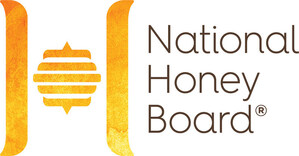September 2012: 346,000 Babies in the United States Will Turn One and Can Now Enjoy Honey
National Honey Board Creates a Buzz around First Birthday Celebrations
FIRESTONE, Colo., Sept. 20, 2012 /PRNewswire/ -- September is National Honey Month, and this year, according to the Centers for Disease Control and Prevention estimates, 346,000 babies in the United States will celebrate their first birthday this month.1 Why are these two facts related? Research findings have uncovered widespread confusion surrounding the age when babies can eat honey. Through educational outreach, the National Honey Board (NHB) aims to dispel honey misconceptions, explain the benefits of honey and remind parents that honey may be given to babies older than one year of age.
(Photo: http://photos.prnewswire.com/prnh/20120920/SF78610)
The National Association of Pediatric Nurse Practitioners (NAPNAP), the American Academy of Pediatrics (AAP) and other health care provider associations recommend that certain foods, including honey, not be fed to infants under age one. Since honey comes directly from nature, it can be a potential source of botulinum spores (bacteria that can sicken infants). After turning one year of age, the child's digestive system is "grown up" enough to digest honey.
"It's widely known that honey shouldn't be fed to infants, but most people don't know why or at what age it can be introduced," said Cheri Barber, DNP, RN, CRNP, and President of NAPNAP. "The truth is that honey can be introduced to a child at one year of age. It's important that health care professionals and families with young children understand the facts about honey. It's always best to consult your health care provider for any advice."
The NHB and NAPNAP joined forces to study consumer understanding of this issue. They conducted focus groups and fielded an online nationwide survey of 500 moms with children ages 5 and younger and found a need for honey education. The research showed that moms are nearly as likely to think honey is a potential food allergen as they are to identify its association with bacterial illness (36% avoid feeding infants honey because they think it's an allergen, 39% avoid honey due to its association with bacterial illness). Only one percent of moms chose "risk of botulism" as a reason to avoid feeding honey to infants. According to the research, more than half (57%) erroneously think babies should be 2 years or older before feeding them honey. Visit http://www.honey.com for the research methodology.
"Another reason why NAPNAP wants to educate parents about the first birthday point-in-time is because honey helps to soothe and relieve the irritation of a cough," adds Barber. "With the FDA and manufacturers now saying that over-the-counter (OTC) cough and cold medicines should not be given to children under 4, parents are turning to effective natural alternatives like honey."
Emerging research supports this natural approach. A well-cited U.S. study funded by the NHB and conducted by the Penn State College of Medicine found that a small dose of buckwheat honey given before bedtime provided better relief of nighttime cough and sleep difficulty in children than no treatment or OTC cough medicines containing dextromethorphan.2
"First birthdays are an exciting milestone for both parents and children, and we're hoping that the introduction of honey into a child's diet is another positive experience," says Catherine Barry, director of marketing for the National Honey Board. "In our research, we found that, in general, moms expressed excitement about rediscovering honey and its uses as a culinary ingredient and as a natural cough suppressant, and want to learn more about honey."
To learn more about honey, and to download an educational PDF, please visit www.honeyfirstbirthday.com.
The National Honey Board (NHB) conducts research, advertising and promotion programs to help maintain and expand markets for honey and honey products. These programs are funded by an assessment of one cent per pound on domestic and imported honey. The National Honey Board is an equal opportunity provider and employer. Visit www.honey.com for more information. The National Association of Pediatric Nurse Practitioners (NAPNAP) is the professional organization for pediatric nurse practitioners (PNPs) and other advanced practice nurses who care for children and is committed to improving the health care of infants, children, adolescents and young adults. An association of nearly 7,500 health care providers throughout the United States, NAPNAP has 48 chapters nationwide. For more information, visit www.napnap.org.
1. Provisional data from the National Vital Statistics System, National Center for Health Statistics, CDC. Retrieved from: http://www.cdc.gov/nchs/data/dvs/provisional_tables/provisional_table01_2011Dec.pdf
2. Paul, I., Beiler, J., McMonagle, A., Shaffer, M., Duda, L., & Berlin, C. (2007). Effect of honey, dextromethorphan, and no treatment on nocturnal cough and sleep quality for coughing children and their parents. Archives of Pediatric and Adolescent Medicine, 161(12). Retrieved from http://archpedi.jamanetwork.com/article.aspx?articleid=571638
SOURCE National Honey Board
WANT YOUR COMPANY'S NEWS FEATURED ON PRNEWSWIRE.COM?
Newsrooms &
Influencers
Digital Media
Outlets
Journalists
Opted In





Share this article